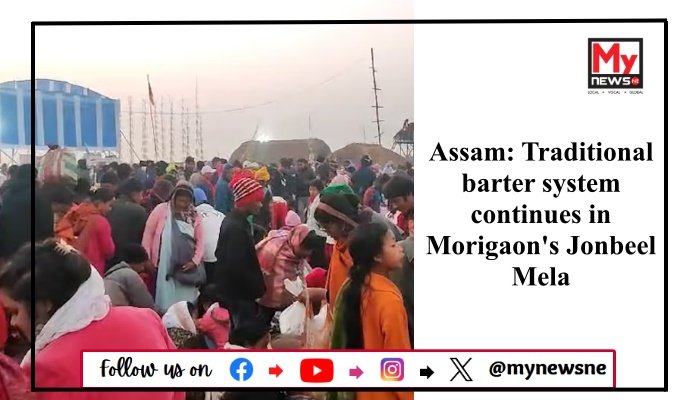Assam: Jonbeel Mela Celebrates Age-Old Barter Tradition with Unity and Vibrance
Assam: The Jonbeel Mela, a symbol of Assam’s rich cultural heritage, witnessed a historic moment on its second day as the traditional barter system was formally inaugurated by Ramakant Deori, MLA of Morigaon constituency. The ceremony began with the exchange of messages of harmony and unity, known as Pahar Bhaiyyam, from Dokmokali, setting an atmosphere of cultural pride and communal bonding.
The unique barter system, a defining feature of the Jonbeel Mela, saw enthusiastic participation from various indigenous communities, including the Tiwa, Karbi, Khasi, and Jaintia tribes. Farmers and traders from the hills and plains gathered in vibrant markets to exchange essential goods such as rice, vegetables, dried fish, and local herbs—all without the use of currency. This age-old practice, rooted in mutual cooperation and self-sufficiency, highlighted the deep cultural and economic ties that bind these communities together.
Addressing the gathering, MLA Ramakant Deori emphasized the importance of preserving such indigenous traditions amidst the growing tide of modernization. He noted that the barter system serves as more than just an economic exchange—it symbolizes cultural identity, strengthens community bonds, and fosters a sense of unity among diverse groups.
The day’s celebrations were further enriched by colorful displays of traditional attire, folk music, and dance performances, adding to the vibrancy of the mela. The Pahar Bhaiyyam ritual, a powerful symbol of unity and peace, resonated deeply with the attendees, reflecting the mela’s core values of harmony and brotherhood.
As the Jonbeel Mela continues, it stands as a testament to Assam’s enduring traditions, bringing together communities in a celebration of heritage, unity, and mutual respect.
Read More: Guwahati Gears Up for Inaugural Asian Film Festival 2025

